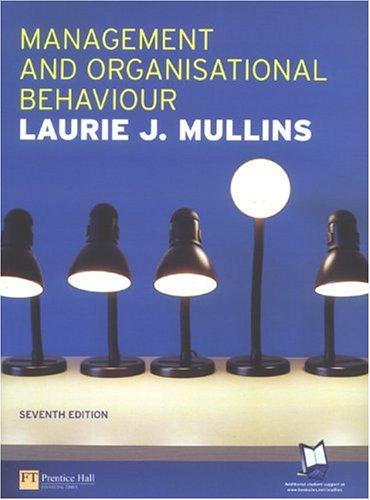The following case is based on research carried out by Linda Hicks and Gill Norris in 1995.
Question:
The following case is based on research carried out by Linda Hicks and Gill Norris in 1995. At that time the programme was being used by a large public sector organisation, which we have called Edgeworth. Edgeworth deals with the services for the community - education, fire service, police, waste clearance, social services, library services etc.
As part of its training and development policy and involvement in Opportunity 2000, Edgeworth had chosen a programme called Springboard to develop its women employees. The programme, designed by two consultants in the UK, Liz Willis and Jenny Daisley, set itself a number of aims: to provide opportunities for women to acknowledge and value their skills and qualities, to develop their confidence and to set goals for the future.
The programme consists of a structured workbook with a series of exercises, case studies and activities which include the following: goals and objectives;
world about you; knowing yourself; finding support; the assertive you; more energy - less anxiety; managing your image; blowing your own trumpet and making it happen. To support the workbook and programme, Edgeworth developed small group tutorial sessions and large group workshops. The programme lasted three months, at the end of which there was a workshop which celebrated the achievement of its participants. There were, however, no formal assessments or any certificates of attainment.
During the course the women were encouraged to participate fully in the sessions, to openly discuss their worries, fears, ambitions and goals with the group. A tutor, who had previously completed the programme, facilitated the sessions and ensured that the goals of the workbook were met.
METHOD OF STUDY
Two Springboard cohorts (80 per programme) were used for the study. One cohort was used for observation and for piloting the questionnaire. Participants of the second cohort were asked to complete a questionnaire at the start of the programme, on the last day of the programme and three months after the programme had finished. Only those participants who completed three questionnaires were used for comparisons (24 in total).
The first questionnaire asked respondents for their reasons for enrolling on Springboard, their current education and training profile, their current moods (whether they wished to improve themselves, or to realise new goals, etc.).
Evaluating the experience was the purpose of the second questionnaire and it asked questions about the content of the programme, focusing on the workbook, in particular, and on the process of the training - for example, the quality of the small group sessions, etc.
Three months later respondents were asked questions on their work goals, whether they had started any new education courses and whether on reflection they felt that Springboard had any lasting impact.
In addition to the Springboard cohort, a control group of Edgeworth employees were sampled (500 in total). These employees would be facing the same challenges and changes within the organisation as the Springboard participants but without the training intervention. Only those employees who completed three questionnaires were used, which totalled 45 males and 73 females.
FINDINGS Enjoyment
The participants clearly enjoyed the Springboard experience. All reported that the programme had been useful to some degree and 75 per cent claimed they felt differently as a result of the programme. 71 per cent claimed it was 'just right'. Even when a negative comment was made, it was against an overall background of positive evaluation. These comments included:
'I became a new person.'
'Thank you Springboard for giving me a kick start to a new career.'
'A real treat to be able to take time to look at the way life was going.'
'I feel I can plan my own future, not just as a wife and mother, but as an individual who wants more from work and a better balance at home.'
'I feel much more positive and happier about life … I realise I can change the things I am not happy about.' Three months later positive feelings were still prominent although some questioned the impact of the programme on their future work opportunities:
'Job changes not materialised. Very glad I attended
Springboard. It developed my assertiveness and self-worth.' The desire for self-improvement and to achieve new goals remained very strong among the participants and in many ways this demonstrates the success of the programme in its aim of reinforcing a sense of self-determination and desire for improvement.
Few, however, thought the programme had any lasting effect on actual work performance, believing instead that personal skills and their feelings of self-worth were the more permanent effects.
Questions
(a) Explain fully why you believe the development programme has enhanced feelings of morale and self-worth in the female participants. In your answer, refer to theories of learning and motivation.
(b) Critically assess the method used in the research study and explore alternative techniques in evaluating the programme.
(c) Do you think the programme would have had such a positive effect if the women had been working individually through the workbook? Give reasons for your answer.
(d) What are the strengths and weaknesses of a women-only programme? Should the programme be offered to men as well? Justify your answer.
Step by Step Answer:






